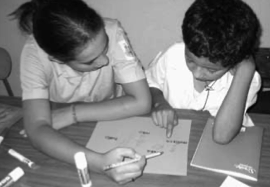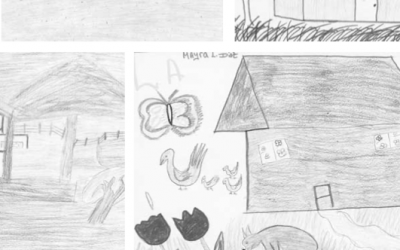Collaborating with Amigos del Aprendizaje
Towards Academic Success for Disadvantaged Children in Costa Rica

ADA Tutoring at the España School
Three out of every 10 children that enroll in school in Costa Rica will drop out before completing primary school. Moreover, only two of those remaining seven children will graduate from high school on time. International research on reading has found a strong relationship between reading difficulties in the early grades and later school dropout. In the U.S., for example, children not reading at grade level by the end of third grade are at high risk for not finishing high school.
Grade retention is also a strong predictor of school dropout. In 2002, 15%, or 13,806 children, repeated first grade in Costa Rica. Research suggests that simply repeating a grade does promote children’s success. Retention in grade only helps if it gives children access to remediation or a different instructional approach. Poor children are at a disproportionately high risk of being retained in a grade and consequently at a higher risk of dropping out of school.
Until recently, it was thought that children arrived at first grade as blank slates, ready (or not) to learn to read. New research shows that reading is part of a complex developmental process that begins before first grade with oral language skills and early literacy skills and culminates in a child with a rich vocabulary; a sophisticated understanding of the functions of print, knowledge of the specific sounds and letters that make up words, and language comprehension skills. While some children develop these skills at home, many do not, which puts them at risk for reading difficulties and for retention in first grade. Children of parents who have not completed primary school, or of families living in poverty, are at a particularly high risk of reading difficulties, falling behind, and dropping out of school. However, recent studies indicate that targeted interventions to develop early literacy skills among economically disadvantaged preschool-aged children can make a significant difference in their academic performance in first grade and beyond.
Developmentally appropriate teaching practices can stimulate young children, these studies indicate. Reading aloud and discussing children’s literature, engaging in rich conversations about interesting topics, and involving children in activities using letters and written words motivate interest and support later competency in reading.
In 2002, Amigos del Aprendizaje (ADA, or Friends of Learning), a Costa Rican non-profit association, approached the authors of this article to collaborate with them and the Costa Rican Ministry of Education, to design and implement a program targeted at developing early literacy skills in kindergarten children. Currently, the impact of three distinct strategies for intervention: tutoring, family involvement, and classroom instruction is being evaluated through a study of 230 public school preschoolers.
ADA promotes early reading skills among “at-risk” children in Costa Rican elementary schools to prevent grade retention and school dropout. Through its involvement of volunteer tutors and sponsors, ADA also promotes a culture of social responsibility and fosters partnerships between the public and private sectors. The design of ADA’s methodology takes advantage of the latest empirical research on the relationship between early literacy instruction and the prevention of difficulties in reading—it focuses on developing a familiarity with the basics of reading for early school success.
The ADA-Harvard collaboration will also result in the 2004 piloting of two additional program interventions to support development of critical early literacy skills among preschool children in “at risk” communities. These will emphasize teacher professional development and the increased involvement of families. Preliminary results indicate that the interventions have been effective in strengthening disadvantaged Costa Rican kindergarteners’ early literacy skills.
ADA’s program strives to meet the following overall objectives:
Among kindergarteners: Promote early literacy skills among preschool children in at-risk communities; improve success in reading among first grade children in these communities; and reduce first grade retention.
Among tutors and sponsors: Promote a culture of social responsibility among high school and other volunteers; involve the private sector in a meaningful partnership to improve early school success among young at-risk children in their communities.
Winter 2004, Volume III, Number 2
Catherine Snow is Henry Lee Shattuck Professor of Education at the Harvard Graduate School of Education.
Andrea Rolla San Francisco is a doctoral candidate in Language & Literacy at the Harvard Graduate School of Education. They wish to thank Renata Villers and Melissa Arias, their ADA collaborators in Costa Rica, who have been instrumental in the development and implementation of this work.
Related Articles
Editor’s Letter: The Children
A blue whale spurts water joyfully into an Andean sky on my office door. A rainbow glitters among a feast of animals and palm trees. Geometrical lightning tosses tiny houses into the air with the force of a tropical hurricane.
Centroamerica
Cuando Pedro Pirir, fue despedido del taller mecánico donde trabajaba desde hacía muchos años, experimentó una sensación de injusticia y pena que luego se transformó en una voluntad…
Irregular Armed Forces and their Role in Politics and State Formation
As I sat in heavy traffic in the back of a police car during rush hour in the grimy northern zone of Rio de Janeiro, I studied the faces of drivers in neighboring cars, wondering what they thought of…




